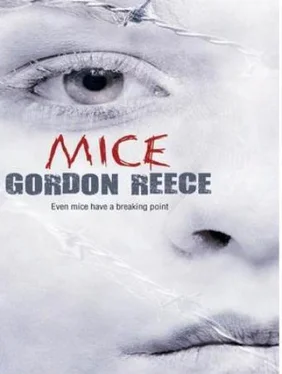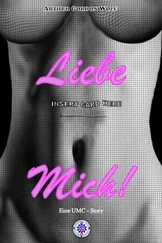With that she stood up. ‘I’ve got to go. I mustn’t be late.’
I stayed where I was, still shocked by her words: should the worst happen and you are arrested. . you are arrested. . you are arrested. .
‘Be brave,’ Mum said. ‘Everything will be all right, you’ll see. We’ll talk tonight.’

I waved half-heartedly as she drove away, but she didn’t glance back at me and make the little glove puppet bow. She was crouched over the wheel, the full force of her mind concentrated like a blowtorch on the problem the night had set her. Our quaint little routine had been shattered — we hadn’t had breakfast together in the kitchen, we hadn’t kissed each other in the hall, I hadn’t told her to drive carefully like I always did. Everything had changed. Everything was changing: should the worst happen and you are arrested. .
I was about to close the front door when I felt it. An eerie, cold sensation that crept over the left side of my face, a sudden self-consciousness, an acute awareness of myself in my own skin, my expression, the position of my hands, the way I was standing. The feeling that someone was watching me.
I scanned the trees and bushes in the island in the middle of the gravel drive, the yawning mouth of the garage with its stepladder and can of oil, the hedge to the right that bordered the farmer’s field, but I couldn’t see anyone. Away to the left were the plants and shrubs that separated the gravel drive from the front garden, and through their tangled foliage I could make out the close-cropped lawn.
And the sinister mound of the oval rose bed.
He’s dead, for God’s sake! He’s dead!
I slammed the door shut and fumbled the chain across.
I still don’t know how I got through that day.
After Mum left, I sat slumped at the dining-room table like a puppet whose strings have been cut. I must have sat there for nearly two hours, reliving the events of the previous night time after time, from the moment I woke up to the moment Mum shattered the burglar’s skull with the chopping board.
It was as if my mind, unable to take in the enormity of the events while they’d actually been happening, had to go back over them obsessively in a desperate attempt to understand them now. I was powerless to resist and sat like a zombie, staring into space, watching the grisly drama unfolding in my mind’s eye in agonizing close-up, hideous slow motion. And when it ended and the burglar was dead, the whole thing simply began all over again.
A loud knock at the front door jolted me back to the present.
The police! It’s the police! How did they find us so quickly?
I sleepwalked my way slowly across the lounge, my exhausted heart beating a frenetic tattoo in my chest once again.
I mustn’t let them in, even if they’ve got a warrant, I mustn’t let them in!
With a shaking hand I pulled back the curtain and peered out of the window. There were no police cars, no flashing blue lights, no black-uniformed officers with their pocket radios crackling. There was only Roger. Roger holding his battered satchel. Roger whistling to himself. Roger squinting up at the cloudless blue sky.
Roger was in extremely good spirits that morning. I’d never seen him so cheery and talkative, almost as if it were his birthday, not mine. He’d bought me a beautiful hardback edition of Daphne du Maurier’s Rebecca and a birthday card with a cartoon dog in artist’s beret and smock saying, I want to paint something special for your birthday — and inside, SO LET’S PAINT THE TOWN RED!
It took an enormous effort to feign the sort of girlish excitement Roger expected me to show when my mind felt on the point of fragmenting into a thousand tiny pieces. Just that word, birthday, with its terrible new associations ( What’s this? It’s my daughter’s birthday present. What is it? ) made my face flush red-hot and tears well up in my eyes, so that I had to blink rapidly to dispel them.
I struggled to answer Roger’s stream of cheery questions ( What did your mum get you? Are you going anywhere special tonight? ), stumbling over my words as if recovering from an anaesthetic or unused to speech, wearing a smile so forced that my face actually hurt with the effort. In case he detected something strained about my enthusiasm, I told him as soon as I could that Mum and I had drunk too much the night before and were both suffering for it this morning.
‘Ye-es, I noticed your eyes were looking rather red, young lady,’ he teased.
We went into the dining room and sat at our usual places, and Roger began to unpack his satchel. I watched him nervously, afraid of what his sharply observant eyes might notice as they glanced around the room. Hugely magnified, they darted this way and that behind his thick lenses like intelligent green fish. Would they notice something that we’d missed? A twist of the ragged rope he’d used to tie us up protruding from beneath the sofa? The white stump where the miniature cottage’s chimney had been? A triangular shard of the broken vase lying next to his chair leg? What was the tiny thread that would unravel everything? I doodled manically in the margin of my notebook, not daring to look up in case something in my expression betrayed my anxiety.
To me, everything in the dining room was tainted, compromised, impregnated by the events of the previous night — the sideboard and the antique writing desk had been ransacked by the burglar just a few hours before; the wooden bowl of potpourri had been knocked to the floor in his frantic search; the ornaments on the sideboard had been scooped into the red sports bag he’d been holding when I’d stabbed him; his knife had been lying on the dining-room table (exactly where Roger now placed his pen case) when I’d snatched it up on my way out into the garden; the very chair Roger sat in, the one with the chipped back, was the one in which Mum had been bound hand and foot, meekly awaiting her fate.
I was convinced Roger would be able to see the traces these events had left behind them standing out as clearly as the vapour trails of jets in an azure sky. I expected him to cry out at any second: What’s happened here, Shelley? Something terrible’s happened in this house!
It seemed impossible to believe that for him the dining room was just as it had always been, that there was nothing different about the writing desk, the ornaments on the sideboard, the chair he was sitting in; that the sinister change that had come over everything was simply the projection of my guilty mind. I was convinced he’d notice something that Mum and I had missed, some tiny incriminating detail we’d been too tired to see. And if he did. . what then? Mum hadn’t told me what to do if Roger discovered our secret.
After a seemingly interminable period getting his notes in order, Roger began on the origins of the First World War, a subject he was fast on his way to becoming a genuine expert in. I nodded and uh-huhed and occasionally wrote something in my notebook while my mind, safe from detection in its impenetrable secret self, carried on obsessively playing back the events of the night before.
‘You have to remember that Germany was tied to the Schlieffen plan, which called for France to be knocked out in a lightning attack so that all Germany’s forces could then be concentrated on Russia — it was an absolute article of faith for them.’
Don’t do anything or you’ll get this!
‘If the Russians completed their mobilization, they would be able to bring six million men under arms, and in spite of their defeat by Japan, there was still great fear in Germany of “the Russian steamroller”.’
Читать дальше













